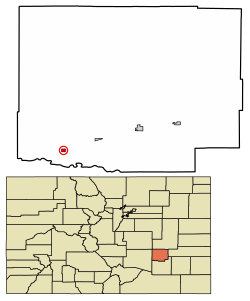Olney Springs, Colorado
Olney Springs, Colorado | |
|---|---|
Town | |
 Olney Springs' town hall and welcome sign. | |
 Location of Olney Springs in Crowley County, Colorado. | |
| Coordinates: 38°9′57″N 103°56′45″W / 38.16583°N 103.94583°WCoordinates: 38°9′57″N 103°56′45″W / 38.16583°N 103.94583°W | |
| Country | |
| State | |
| County[1] | Crowley |
| Incorporated (town) | May 27, 1912[2] |
| Government | |
| • Type | Statutory Town[1] |
| Area | |
| • Total | 0.24 sq mi (0.62 km2) |
| • Land | 0.24 sq mi (0.62 km2) |
| • Water | 0.00 sq mi (0.00 km2) |
| Elevation | 4,383 ft (1,336 m) |
| Population (2010) | |
| • Total | 345 |
| • Estimate (2019)[6] | 340 |
| • Density | 1,410.79/sq mi (545.66/km2) |
| Time zone | UTC-7 (Mountain (MST)) |
| • Summer (DST) | UTC-6 (MDT) |
| ZIP code[5] | 81062 |
| Area code(s) | 719 |
| FIPS code | 08-55705 |
| GNIS feature ID | 0195368 |
Olney Springs is a Statutory Town in Crowley County, Colorado, United States. The population was 345 at the 2010 census.[7]
A post office called Olney Springs has been in operation since 1909.[8] The town was named after one Mr. Olney, a railroad official.[9]
Geography[]
Olney Springs is located in southwestern Crowley County at 38°9′57″N 103°56′45″W / 38.16583°N 103.94583°W (38.165844, -103.945723).[10] Colorado State Highway 96 leads east 11 miles (18 km) to Ordway, the county seat, and west 38 miles (61 km) to Pueblo.
According to the United States Census Bureau, the town has a total area of 0.2 square miles (0.52 km2), all of it land.
Slightly west of the town is the Crowley County Correctional Facility, owned by the Corrections Corporation of America. It has 1,794 prisoners from various states. Built as a speculative venture in 1998, it had a massive riot in 1999 when operated by the now-defunct Community Services Corporation. The builder, Dominion Ventures, took over its management, and in January 2003 ownership and operation transferred to CCA. Another devastating riot took place on July 20, 2004, once again requiring massive intervention by local and state law enforcement and correctional personnel.[11]
Demographics[]
| Historical population | |||
|---|---|---|---|
| Census | Pop. | %± | |
| 1920 | 240 | — | |
| 1930 | 228 | −5.0% | |
| 1940 | 260 | 14.0% | |
| 1950 | 279 | 7.3% | |
| 1960 | 263 | −5.7% | |
| 1970 | 264 | 0.4% | |
| 1980 | 253 | −4.2% | |
| 1990 | 340 | 34.4% | |
| 2000 | 389 | 14.4% | |
| 2010 | 345 | −11.3% | |
| 2019 (est.) | 340 | [6] | −1.4% |
| U.S. Decennial Census[12] | |||
As of the census[13] of 2000, there were 389 people, 145 households, and 99 families residing in the town. The population density was 1,673.6 people per square mile (653.0/km2). There were 161 housing units at an average density of 692.7 per square mile (270.3/km2). The racial makeup of the town was 81.75% White, 0.51% African American, 2.57% Native American, 12.60% from other races, and 2.57% from two or more races. Hispanic or Latino of any race were 21.85% of the population.
There were 145 households, out of which 35.9% had children under the age of 18 living with them, 50.3% were married couples living together, 13.1% had a female householder with no husband present, and 31.7% were non-families. 26.9% of all households were made up of individuals, and 14.5% had someone living alone who was 65 years of age or older. The average household size was 2.68 and the average family size was 3.31.
In the town, the population was spread out, with 34.7% under the age of 18, 4.9% from 18 to 24, 26.0% from 25 to 44, 19.0% from 45 to 64, and 15.4% who were 65 years of age or older. The median age was 33 years. For every 100 females, there were 96.5 males. For every 100 females age 18 and over, there were 92.4 males.
The median income for a household in the town was $25,536, and the median income for a family was $30,000. Males had a median income of $18,958 versus $17,222 for females. The per capita income for the town was $13,554. About 9.4% of families and 13.9% of the population were below the poverty line, including 16.0% of those under age 18 and 22.6% of those age 65 or over.
See also[]
- Outline of Colorado
- State of Colorado
- Colorado cities and towns
- Colorado municipalities
- Colorado counties
- Colorado cities and towns
References[]
- ^ Jump up to: a b "Active Colorado Municipalities". State of Colorado, Department of Local Affairs. Archived from the original on 2009-12-12. Retrieved 2007-09-01.
- ^ "Colorado Municipal Incorporations". State of Colorado, Department of Personnel & Administration, Colorado State Archives. 2004-12-01. Retrieved 2007-09-02.
- ^ "2019 U.S. Gazetteer Files". United States Census Bureau. Retrieved July 1, 2020.
- ^ "US Board on Geographic Names". United States Geological Survey. 2007-10-25. Retrieved 2008-01-31.
- ^ "ZIP Code Lookup". United States Postal Service. Archived from the original (JavaScript/HTML) on January 1, 2008. Retrieved November 27, 2007.
- ^ Jump up to: a b "Population and Housing Unit Estimates". United States Census Bureau. May 24, 2020. Retrieved May 27, 2020.
- ^ "Geographic Identifiers: 2010 Demographic Profile Data (G001): Olney Springs town, Colorado". U.S. Census Bureau, American Factfinder. Archived from the original on February 12, 2020. Retrieved June 24, 2014.
- ^ "Post offices". Jim Forte Postal History. Retrieved 6 July 2016.
- ^ Dawson, John Frank (1954). Place names in Colorado: why 700 communities were so named, 150 of Spanish or Indian origin. Denver, CO: The J. Frank Dawson Publishing Co. p. 38.
- ^ "US Gazetteer files: 2010, 2000, and 1990". United States Census Bureau. 2011-02-12. Retrieved 2011-04-23.
- ^ http://www.privateci.org/private_pics/col1004.pdf
- ^ "Census of Population and Housing". Census.gov. Retrieved June 4, 2015.
- ^ "U.S. Census website". United States Census Bureau. Retrieved 2008-01-31.
External links[]
- Olney Springs page at Crowleycounty.net
- CDOT map of the Town of Olney Springs
- Towns in Crowley County, Colorado
- Towns in Colorado


